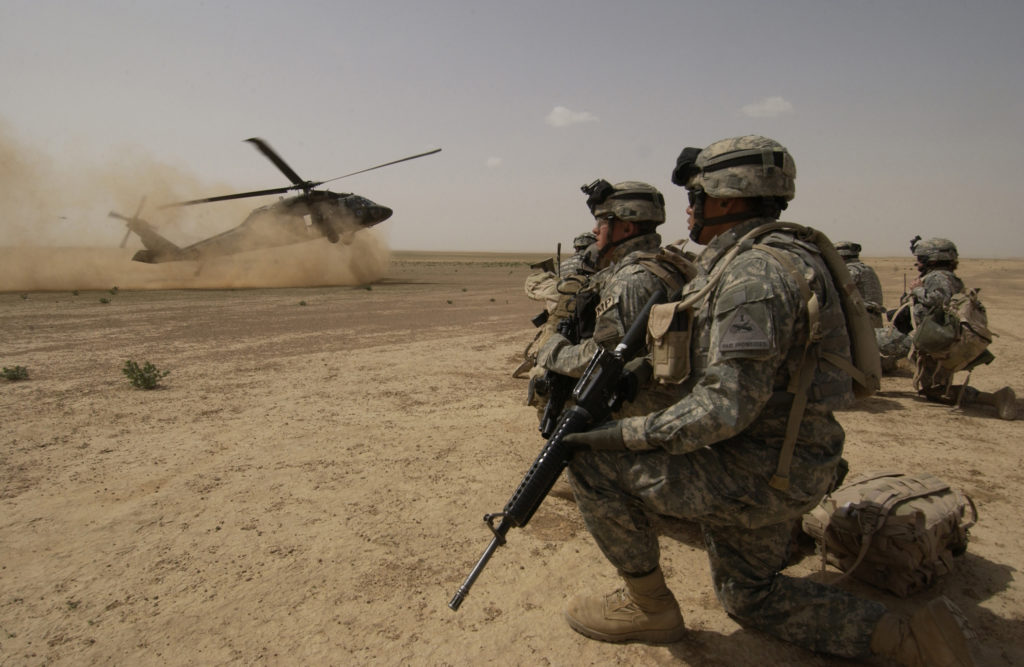
U.S. Army soldiers wait to board a UH-60 Black Hawk helicopter during an air assault mission in the Al Jazeera Desert, Iraq, on March 22, 2006. (DoD photo by Staff Sgt. Aaron Allmon, U.S. Air Force.)
Today marks the 16th anniversary of the U.S.-led invasion of Iraq.
Since Washington is preoccupied with the “imminent” release of the Mueller report (“like waiting for a baby”), there may not be as many analyses and post mortems of this monumental failure in U.S. foreign policy – and of its legacy — as during previous anniversaries.
But one thing is certain, the legacy of the Iraq War still haunts Iraq, the Middle East and still divides Americans.
Of course, the saddest legacy and statistic of that war is the number of casualties and the resulting miseries that are still afflicting the Iraqi people and the people in the region.
We must never forget the more than 4,500 American heroes who made the ultimate sacrifice, nor the more than 30,000 U.S. service members wounded, nor the Iraqi civilian and combat casualties that have grown to 288,000 during the past 16 years, “although unofficial estimates put the number as high as one million.”
Nor the millions of internally displaced persons in Iraq and millions of refugees making it the largest diaspora in the Middle East in recent memory.
Nor should we ignore persistent claims of how the Iraq War and the “First Gulf War” have caused significant increases in cancer, leukemia and congenital birth anomalies in Iraq. due to the use of shell casings, bullets and bomb fragments laced with depleted uranium and the dumping of “hundreds of tonnes of depleted uranium and other toxic wastes into the soil and waterways.”
So, what do the American people think of the Iraq War on its 16th anniversary?
Again, Washington (except Eric Fleischer) may be too focused on the Trump scandals, investigations and on the “imminent” Mueller report to give it too much thought.
However, one year should not have changed opinions that much.
So, here are some thoughts by a man who served tours in Iraq and Afghanistan, expressed on the 15th anniversary of that war.
Army Major Danny Sjursen’s advice:
Ignore the Beltway pundits on both sides. The neoconservatives who controlled GOP foreign policy at the time claim that President Obama lost a war that could’ve/would’ve/should’ve been won with a few more troops and a few more years’ commitment. That’s fantasy. The Democratic Party establishment, on the other hand, seeks to blame every problem in the Middle East on “Bush’s war”—downplaying their complicity as early cheerleaders.
Sjursen continues:
The reality is simpler, less grandiose. The war in Iraq was an ill-conceived crusade, with little thought about what came afterward. America entered into a regional trap of its own making. When we zoom out and view the war in its entirety, through a broad lens, it becomes clear that neither Bush, nor Obama, nor much-praised Gen. David Petraeus could save the United States from its greatest foreign policy blunder in a generation. Tactics couldn’t remedy poor strategy. American naiveté, and hubris, placed U.S. soldiers in an unwinnable and bloody cauldron of civil and proxy war involving Iraqis, Saudis, Iranians, and various extractions of iterant jihadis.
Major Sjursen quotes the results of a “recent” (March 2018) poll revealing that “by and large, Americans don’t believe the Iraq War made them safer or the region more secure. A sweeping majority of Americans — 67 percent — now feel that the war either failed to improve or, worse yet, undermined American interests. Meanwhile, 47 percent of those polled about the war’s impact on regional stability responded that the 2003 invasion has degraded security in the Middle East.”
One American, however, is still mincing words about the infamous “Weapons of Mass Destruction” (WMD) allegedly held by Saddam Hussein.
In a twitter thread on the eve of the anniversary, Former Bush administration press secretary Ari Fleischer, writes:
The Iraq war began sixteen years ago tomorrow. There is a myth about the war that I have been meaning to set straight for years. After no WMDs were found, the left claimed ‘Bush lied. People died.’ This accusation itself is a lie. It’s time to put it to rest.
Please read an excellent historical record on Iraqi WMDs and whether the Bush administration “hyped the evidence” here.
















